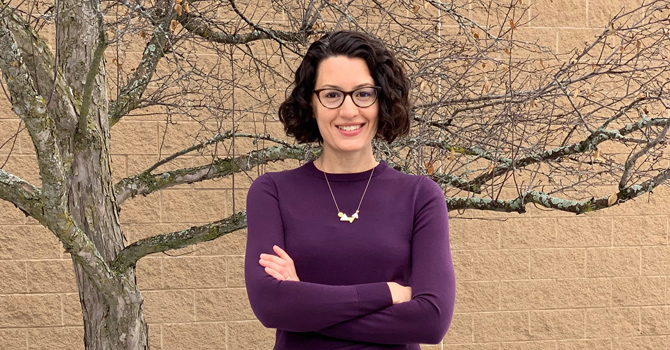Recovering from 9/11 and Moving Public Health to the Front Lines of Disaster Response

Theresa Gorman, MPH ’11
Occupational Safety Specialist, University of Vermont
I grew up in a suburb of New York City, and my father was a firefighter in the New York City Fire Department. I was a senior in high school when the terrorist attacks at the World Trade Center in New York happened on September 11, 2001.
What followed shaped my college experience and ultimately my career. I had a firsthand account of the enormous effort to clean up the debris pile from the collapsed towers and how rescue and recovery workers began to suffer from various respiratory symptoms after working long hours at Ground Zero.
The impact I knew research could have helped me decide to make occupational safety my career.
I chose to major in public health as an undergraduate at Hampshire College and wrote my senior thesis on the health effects of the 9/11 recovery effort. The thesis was accepted as a research poster presentation at the American Public Health Association’s annual meeting. While at the conference, I found Michigan's School of Public Health booth on the expo floor and began learning about the school’s master's of public health in Environmental Health Sciences. The research Michigan was conducting on worker safety and the impact I knew that research could have helped me decide to make occupational safety my career and is what made me choose Michigan.
My concentration at Michigan was in industrial hygiene and hazardous materials management, a field focused on protecting workers in a variety of occupations and protecting any community that could potentially be exposed to toxic chemicals.
I think 9/11 is an example of what happens when public health is not on the front lines of disaster preparedness and response.
I now work in the environmental health and safety unit in the University of Vermont’s Risk Management Department. The environmental health scientists on our staff work directly with researchers across campus. My work is directly with non-lab departments—mostly custodial, physical plant, athletics, and residential life. Supporting professors and students conducting important research is very rewarding. As a safety professional, I work hard to make sure that university staff view me and my department as an asset to their work, not a hindrance.
I think 9/11 is an example of what happens when public health is not on the front lines of disaster preparedness and response. There was not enough coordination of clean-up operations to protect workers, and 18 years later, people are still suffering from the health effects of exposures they had while trying to serve their communities.
Public health professionals have an important role to play in disaster preparedness and response because they can help ensure the safety of both disaster workers and the general public.
At the University of Vermont, we are talking more and more about the increased likelihood of extreme weather events that may occur as a result of climate change. Preparing for and responding to these events will be a more and more crucial aspect of public health practice around the country. A big part of that will be communicating with and earning the trust of community members and organizations before disasters occur. Partnering with community organizations and supporting grassroots public health efforts can help build relationships and establish trust between members of the community and public health agencies.
When I started a career in public health in lower Manhattan, I never thought I would end up living and working in Vermont surrounded by forests and mountains. This is one of the things I love about public health—the ability to work in different environments in different locations and still provide a great service to the public’s health. I constantly challenge myself to keep learning and building meaningful relationships within my organization and within my community.
- Interested in public health? Learn more here.
- Learn more about pursuing an online education.
- Read more stories about alumni, faculty, and students in Environmental Health Sciences.
- Support research and engaged learning at the School of Public Health.
